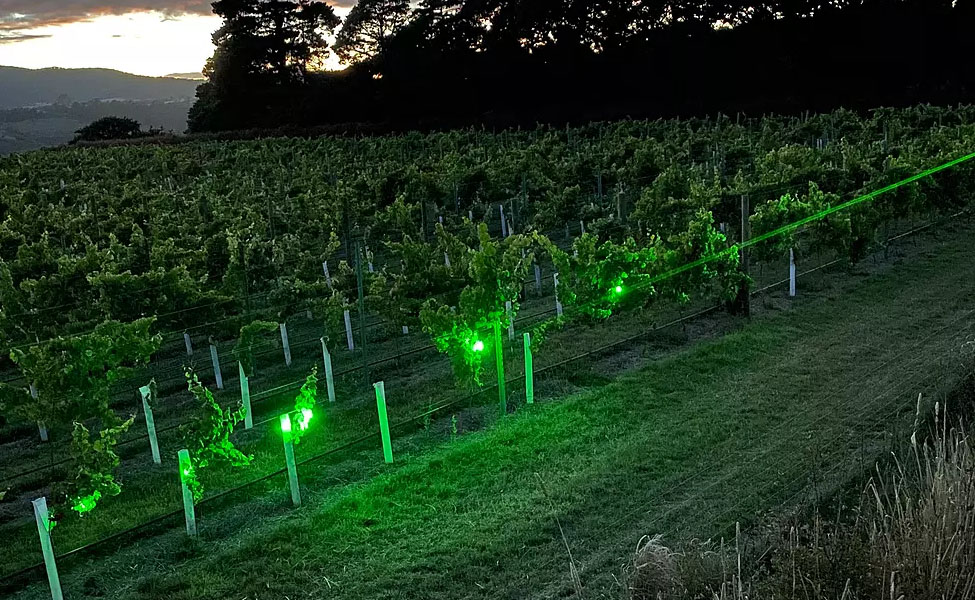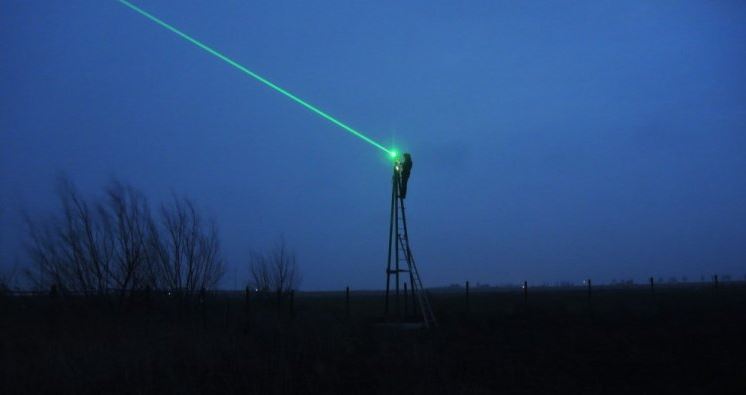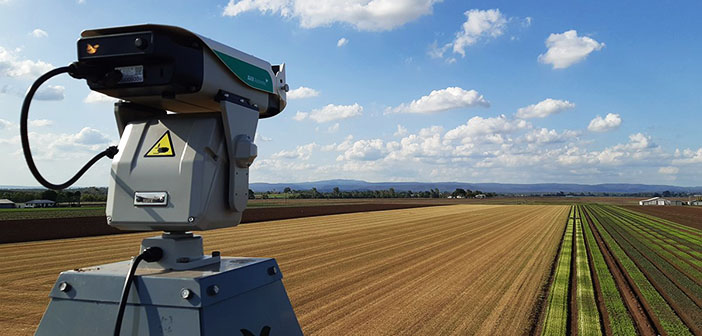Bird Control Group was founded in 2012 as part of an incubator program at the Delft University of Technology in the Netherlands. Since then the company has received multiple awards for its laser-based bird deterrent solutions, with products on sale in over 100 countries. This year two particular uses of its AVIX Autonomic Bird Deterrent product have caught our attention – one involving crop protection and the other bird flu prevention on poultry farms.
Protecting Australia’s almond crops from birds using lasers
Australia’s Almond Centre of Excellence (ACE) lies in the town of Loxton in the Riverland region of South Australia. Loxton is known for its citrus fruit, wine grapes, almond and stone fruit trees. Now, in a government funded trial, the AVIX Autonomic Bird Deterrent is being used at one of the centre’s experimental orchards.
State Government funding of AU$50,000 allowed for the purchase and installation (on towers) of two of the three lasers required to cover the 60 hectare experimental orchard, with a third laser funded by the Almond Board of Australia.
Located above the tree canopy, the AVIX bird control lasers are programmed to operate within the dimensions of the property, moving quickly from tree to tree, disturbing but not harming the birds. The system can be programmed and monitored through an IOS and Android app.
“Many birds quickly become accustomed to commonly used bird deterrence systems of noise producing gas guns, so the use of laser constantly scanning across the orchard appears to have some positive impacts.” said Minister for Primary Industries and Regional Development – David Basham. He also acknowledged that the project demonstrated innovative thinking using technology to solve agriculture industry challenges.
“Riverland and Northern Adelaide Plains orchards can suffer significant crop losses – estimated at two per cent or AU$3 million per annum in South Australia – as a result of the predation of 10 different bird species.
“This trial is an example of farmers seeking a solution to an ongoing industry problem and the application of innovative technology used in the grape industry to the almond industry.”
ACE’s experimental orchard manager, Anthony Wachtel said that the trial was going well. “So far the laser has been effective across the diverse number of bird species that seek to feed on tree nuts and is far more convenient than the use of traditional deterrent measures at dawn and dusk when bird numbers tend to peak.”
The interest in trialling the laser technology in almond orchards arose after grape growers successfully used lasers to move birds on from their vineyards.

Michelle Kerr, Managing Director of Australian AVIX reseller Bird Beam Laser Bird Control Systems said “It’s great to see more proof of concept results from ACE. We have seen an 80 to 90% reduction in birds in a NSW location, I absolutely know it will be a game changer for them.”
Reducing avian influenza risk on free range poultry farms
Wild water birds such as ducks and geese are known to be a natural reservoir for avian flu viruses. This is a particular problem for free-range poultry farmers seeking to protect their birds from exposure to migratory or overwintering birds which can spread the H1N1 virus through their droppings. A recent study conducted by Wageningen Bioveterinary Research (WBVR) in the Netherlands found that the risk can be almost completely eliminated through the use of bird deterrent lasers.
The WBVR study took place in the winter of 2019-2020 on a poultry farm which had a previous history of avian influenza infections. An AVIX Autonomic Bird Deterrent was installed on a 6-metre-high mast in part of the free-range area directly connected to the barn. Eight wide-angle video cameras were installed on 4m high poles to record visits of wild birds.

When the AVIX Autonomic Bird Deterrent laser was used, almost no wild ducks visited the range (99.7% prevention). In addition, visits of other wild birds to the range between sunrise and 10 am were significantly reduced by the laser (> 96% prevention).
“When the laser was not in use in the study area, many wild geese visited the surrounding grass pastures during the day.” said Armin Elbers, an epidemiologist at WBVR and project leader of the study. “When the laser was being used in the surrounding pastures, the pastures were ‘swept clean’ during the day, and geese were no longer present in the laser-beamed area. The poultry farmer indicated that grazing damage due to the geese presence was negligible when the laser was used.”
“For free-range poultry farms located in high-risk avian flu areas, which had repeated introductions of avian flu virus in the past, we believe that a laser could be helpful as a preventive measure to keep wild birds away from the farm during the high-risk period (October to March). Poultry farms with strictly indoor accommodation have also been infected with avian influenza in the past due to their location near wetlands. Using a laser during the high-risk period could offer a solution to this problem too by keeping wild waterfowl away from the vicinity of the barn.” Elbers concluded.
A more humane solution than netting
Compared to protective solutions like netting, the bird deterrent lasers from Bird Control Group are far more humane. Birds can easily become trapped in netting, leading to damage of their wings or even slow death. Birds will perceive the AVIX system’s approaching laser beam as a physical danger and disperse to seek safety without ever becoming accustomed to it (as they do with audio bird scarers). Bird Control Group states that the World Wildlife Fund has recognised its products for providing an effective, animal and environmentally friendly alternative.



